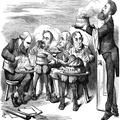Essay Introduction
The First World War, which occurred from 1914 to 1918, was a devastating military conflict that involved numerous nations around the world. At the time, this global war was supposed to be “the war to end all wars,” a quote made famous by President Wilson. However, post-war decisions would eventually lead the way to another world war, one with similarly devastating proportions. Modern military technology like automatic machine guns, toxic gases, airplanes, submarines, tanks, and grenades combined with traditional fighting tactics resulted in carnage unlike ever before. While the United States is known for leading the Allies to victory in 1918, American soldiers were not involved in combat until three years after the fighting had already started. Wilson and the United States intended to stay neutral throughout the war, but certain economic factors ultimately pushed the Americans into the fighting as well. The main reason the United States joined the Allies in the First World War was to make sure war loans would be paid back and to prevent valuable exports from being destroyed by German submarines.
Research Paper on World War 1 Essay
As the “Great War” broke out in Europe in 1914, the immediate response from President Wilson was to keep the United States neutral. Most American citizens agreed with this decision, as most people in the country did not want to be involved in another military conflict. After the United States forcibly occupied Cuba and the Philippines during the Spanish-American War and the Philippine-American War at the turn of the century, most American citizens were turned off by the idea of entering a war within another country’s borders. Entering a war would also be very costly and would cause countless American casualties.
By 1914, the American population had a diverse mix of ethnicities. Some Americans were immigrants or descendants of immigrants from Germany, Ireland, Austria-Hungary, and other Slavic nations, meaning they still had close ties with their homeland and generally still supported the Central Powers. However, more Americans, especially those with political power, supported the Allied Powers because they spoke English like the British and had British ancestral ties. This divided opinion caused tensions between different ethnic groups, so neutrality was important to help keep peace within the United States (Blum).
Argumentative Essay Examples on World War 1 Essay
Progressive women like Jane Addams, founder of Hull House, and Carrie Chapman Catt of the National American Woman Suffrage Association led passionate anti-war movements to convince Congress not to go to war. Henry Ford, owner of Ford Motor Company, traveled across Europe in 1915 to advocate peace. The Socialist Party was heavily involved in the anti-war effort as well. According to an excerpt written by the Emergency Committee to President Wilson, “We, the Socialist Party, constitute a large portion of the common mass of the people, whose voices are not heard in the metropolitan press, but whose hearts are right and who do not want war. It is the voice of the common people you should hear before you act” (Work 33). It is clear that neutrality during the First World War was favored by most American citizens. President Wilson even used the slogan “He kept us out of war” to help him get re-elected in 1916. However, a series of unfortunate events eventually led to American military involvement (Work).
Argumentative Essay Examples of World War 1
From the beginning of the war in 1914, Britain and France decided that the most effective way to win the war was to create a naval blockade in the North Sea and the Mediterranean Sea. This was created to prevent any resources or supplies from entering the Central Powers, a technique that Britain believed would devastate the German population and quickly end the war. At this time, Britain had a powerful Royal Navy and solid control of the seaways in Western Europe. They also had control of most coal-refueling stations, which merchant ships found essential to complete voyages across the Atlantic Ocean.
When neutral countries like the United States continued to trade and loan money to the Central Powers, Britain, and France were angered and decided to intervene. Britain started detaining neutral merchant ships, examining all cargo aboard, and confiscating any resources intended to be sent to Germany. Britain and France also practiced “preclusive purchasing,” meaning that they bought out surplus materials from neutral countries for the purpose of depriving the Central Powers of important resources. For example, when Switzerland was going to export 40,000 heads of cattle to Germany, the Allies threatened to cut off all fodder exports to Switzerland. Switzerland was dependent on fodder imports to feed their livestock, so they signed the “Allied-Swiss pact of 12 May 1917,” which was a “Swiss commitment to limit cattle exports to the enemy in exchange for guaranteed reception of fodder from the Allies” (Farrar).
American companies that were known to be supplying the Central Powers were blacklisted and prevented access to British-controlled waterways. Americans were angered by this trade interference, but American companies could not afford to lose access to British-controlled waterways. In order to prevent further interference by the British navy, almost all American companies gave in to British demands and stopped exporting goods to the Central Powers. With trade cut off from the Central Powers, the Allies increased trade with neutral countries while belligerent countries like Germany faced starvation and poverty (Farrar).
Thesis Statement for World War 1 Essay
When the United States declared neutrality at the beginning of the war, they continued to support both sides economically. American banks continued to loan money, and American businesses continued to trade with the Allies and Central Powers. It was not until the Blockade of Germany when American trade with the Central Powers diminished quickly. The American economy started to flourish because of the drastic increase in American exports to the Allies. “Merchandise exports comprised nearly 12 percent of gross national product in 1916, roughly double their share in 1914, and more than in any other year for which data are available” (Fordham).
The exports of “crude and manufactured foodstuff” and manufactured products to the Allies increased dramatically throughout the wartime, putting tons of money into the pockets of industrialists. American banks, over-confident with an Allied victory, loaned billions of dollars to the Allies to help finance the war. According to Senator Gerald Nye, the United States joined the Allies because they were “fighting to save the skins of American bankers who had bet too boldly on the outcome of the war and had two billion dollars of loans to the Allies in jeopardy” (Fordham). Once a substantial amount of money was loaned to the Allies, American banks needed the Allies to win the war so they could pay back the war debts. America now had a serious economic stake in the war (Fordham).
The Blockade of Germany was successful for the Allies in increasing trade and loans with neutral countries and depriving the Central Powers of critical resources. However, the blockade would also cause a whole new problem: Submarine warfare. Angered that the blockade was destroying trade with neutral countries, the Germans decided to sink Allied and neutral merchant ships heading for Britain and France. The decision to conduct submarine warfare was mostly economic since the Germans wanted to stop the Allies from trading heavily with neutral countries (Gompert).
Submarine Warfare and the Sinking of the Lusitania
A major incident that influenced American involvement in the war was the sinking of the Lusitania. The Lusitania was a British passenger ship that was sunk surprisingly by a German submarine on May 7, 1915. People around the world were outraged by this event, considering over one thousand passengers were killed, including 128 Americans. While any civilian fatality is devastating, it would be untrue to say that the loss of American life on the Lusitania was the main reason that the United States entered the war.
The event took place nearly two years before the United States declared war, so obviously, the attack did not prompt urgent action. Also, the passengers aboard the Lusitania were aware that they were traveling through submarine-infested waters before they started the voyage. Finally, the Lusitania was known to be hiding war munitions aboard. This shows that the Lusitania may not have been so innocent after all. This event was just another attack against Allied exports and the economy (Gompert, Blum).
Ideas on the Resumption of Unrestricted Submarine Warfare
The attack on the Lusitania caused outrage across the United States, but not enough to declare war on Germany. While the United States was still a neutral country, more Americans were starting to support the Allies because of the German’s ruthless submarine warfare tactics. After April 1916, when the Sussex was sunk by German Submarines, Germany put restrictions on submarine warfare because President Wilson threatened to cut off any “diplomatic ties” with Germany. However, this peace in the seas was short-lived.
The German Army was weakened, and German citizens were starving because of the Blockade of Germany. Germany’s victory seemed unrealistic, so the Germans decided to resume unrestricted submarine warfare in February 1917 out of desperation. According to Henning Von Holtzendorff, the naval chief of staff for Germany, the Germans “could sink 600,000 tons a month” if they resumed unrestricted submarine warfare (Gompert 66). The Germans were successful. “As advertised by German admirals, U-boats started sinking transatlantic shipping at an unprecedented rate: 25 percent of all British-bound shipping was sunk in March.
By April, the German admiralty prediction of tonnage sunk was being exceeded” (Gompert 67). Many of the merchant ships being sunk were American, which started hurting the American economy. Businesses were losing tons of money worth of exports because sea travel across the Atlantic started to decline, and tons of resources were sinking to the bottom of the ocean. This increased threat on American merchant ships was a major turning point in the war and soon led to American intervention a couple of months later (Gompert).
Conclusion
The United States had several economic incentives to join the Allies in the First World War. The Blockade of Germany basically forced the United States out of neutrality since they could no longer trade or loan money to the Central Powers. As a result, large amounts of exports and loans were being sent to the Allies, boosting the American economy. Now American banks and businesses had an incentive for the Allies to win. If the Central Powers won, American banks would not get their loans paid back. Finally, German submarines started sinking thousands of tons of American exports when they resumed unrestricted submarine warfare, so it sparked a huge economic incentive to join the war. Although most Americans intended to stay neutral throughout the whole conflict, economic pressures eventually pushed the United States into the mix.


